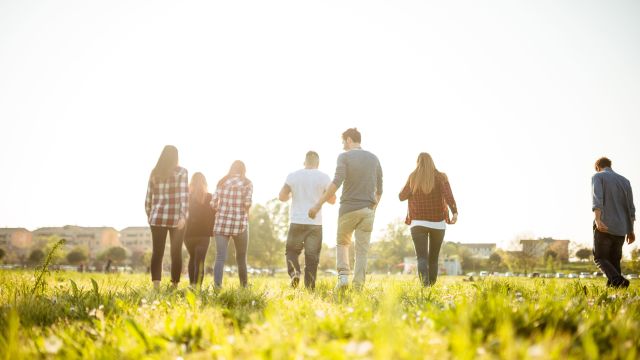Updated on August 2, 2023.
When you picture your golden years, which people do you imagine growing old with? Are you building the types of friendships that could last a lifetime? It turns out that meaningful, long-term friendships can do more than fend off loneliness as you age—your best pals may actually help you live longer.
The key to longevity
“When you think about it, your friends are long-term adventures, and therefore, perhaps the most significant thing you can do to add more years to your life, and life to your years,” says Dan Buettner, National Geographic Fellow and best-selling author of The Blue Zones Solution.
In his research on longevity, Buettner identifies five places in the world where people live remarkably long lives:
- Ikaria, Greece
- Barbagia region of Sardinia
- Nicoya Peninsula, Costa Rica
- Seventh Day Adventists in Loma Linda, California
- Okinawa, Japan
In these “Blue Zones,” people are 10 times more likely to make it to 100 than the average American.
So what do people in Blue Zones have in common? For one thing, they understand the importance of finding—and keeping—“the right tribe.” Your tribe is an uplifting group of friends that brings you happiness and encourages you to stay healthy over the years. In fact, people in the Blue Zone of Okinawa, Japan, become members of small groups called “moais” as young children. Each moai is made up of five people who often stay together and have each other’s backs for life. Even if the members of your moai change over time, you can depend on your group for emotional and financial support during tough times.
The health benefits of friendship
Members of moais tend to share similar healthy habits. That’s important because health habits are contagious: If your friends smoke, eat poorly or have negative outlooks on life, you’re more likely to develop their risky behaviors as well, according to the Framingham Heart Study.
The moai custom is one reason why longevity experts believe that Okinawans have one-fifth the rate of heart disease compared to Americans. They also have drastically lower rates of breast cancer, prostate cancer, and dementia.
Find your Blue Zone
Where you live can play a role in deciding the number and quality of friends you’re able to make. It also can determine whether you stick to other Blue Zone practices like building exercise into your daily routine. For example, if you move to a neighborhood without safe sidewalks, you’ll have to drive instead of walking to work; you might even go years without meeting your neighbors.
That’s why the healthiest communities in America are ones that have vibrant and safe outdoor spaces where people can play, meet, and exercise. So vote, volunteer, and encourage your local leaders to protect the outdoor spaces in your town. Speak up for housing diversity as well: A neighborhood that includes people of all ages, backgrounds, and income levels creates strong and exciting social networks and allows everyone to prosper.
Build your friend group
Regardless of where you live, there are some steps you can take to strengthen your friendships today:
Call old friends. It’s common to lose touch after starting a new phase of life, but it’s never too late to contact someone you care about. Texting, emailing, and calling all can count as meaningful social interaction. Set aside some time each month to catch up—it’s good for your health and you never know how much it could mean for the people you reach out to.
Celebrate your friends’ victories like your own. When someone shares amazing news, don’t respond with an insincere, “I’m so happy for you” and then mope about your own life. Instead, answer with enthusiasm, ask follow-up questions, and feel true excitement when they tell you all about it.
Forgive and ask for forgiveness. Friendship requires honesty and vulnerability. Sometimes you have to put yourself out there—you will need to ask for forgiveness and forgive the other person at some point in your relationship. Those conversations are tough but don’t let a good friendship slip away because you’re afraid of speaking your mind.
Truly listen when they’re down. When a friend is having a tough time, don’t criticize or assume you know what they’re going through. Instead of explaining how you’d handle the situation differently, just listen and be there. Sometimes silence and a hug is the best help you can give.
Nurturing your relationships will pay off in the long run. It may help you live longer, plus your years will be filled with love and support.






